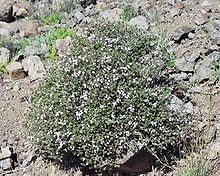Thymus (plant)
Jump to navigationJump to search
| Thymus | |
|---|---|
 |
|
| Thymus vulgaris | |
| Scientific classification |
|
| Domain: | Eukaryota |
| Kingdom: | Plantae |
| Clade: | Tracheophytes |
| Clade: | Angiosperms |
| Clade: | Eudicots |
| Clade: | Asterids |
| Order: | Lamiales |
| Family: | Lamiaceae |
| Subfamily: | Nepetoideae |
| Tribe: | Mentheae |
| Genus: | Thymus L.[1] |
| Type species | |
| Thymus vulgaris
L.
|
|
| Synonyms[2] | |
|
|
The genus Thymus (/ˈtaɪməs/ TY-məs;[3] thymes) contains about 350[4] species of aromatic perennial herbaceous plants and subshrubs to 40 cm tall in the family Lamiaceae, native to temperate regions in Europe, North Africa and Asia.
Stems tend to be narrow or even wiry; leaves are evergreen in most species, arranged in opposite pairs, oval, entire, and small, 4–20 mm long, and usually aromatic. Thyme flowers are in dense terminal heads with an uneven calyx, with the upper lip three-lobed, and are yellow, white, or purple.
Several members of the genus are cultivated as culinary herbs or ornamentals, when they are also called thyme after its best-known species, Thymus vulgaris or common thyme.
Thymus species are used as food plants by the larvae of some Lepidoptera (butterfly and moth) insect species, including Chionodes distinctella and the Coleophora case-bearers C. lixella, C. niveicostella, C. serpylletorum, and C. struella (the latter three feed exclusively on Thymus).
Classification[edit]
A considerable amount of confusion has existed in the naming of thymes. Many nurseries use common names rather than binomial names, which can lead to mix-ups. For example golden thyme, lemon thyme, and creeping thyme are all common names for more than one cultivar. Some confusion remains over the naming and taxonomy of some species, and Margaret Easter (who holds the NCCPG National Plant Collection of thymes in the UK) has compiled a list of synonyms for cultivated species and cultivars.[5]
The most common classification is that used by Jalas, in eight sections: [6]
- Micantes: Iberian Peninsula and north Africa, includes T. caespititius
- Mastichina: Iberian Peninsula, includes T. mastichina
- Piperella: Monotypic section confined to the vicinity of Valencia, Spain
- Teucrioides: Balkan Peninsula
- Pseudothymbra: Iberian Peninsula and north Africa, includes T. cephalotos, T. longiflorus and T. membranaceus
- Thymus: Western Mediterranean region, includes T. camphoratus, T. carnosus, T. hyemalis, T. vulgaris and T. zygis
- Hyphodromi: Throughout the Mediterranean region, includes T. cilicicus and T. comptus
- Serpyllum: The largest section, throughout whole region, apart from Madeira and Azores, includes T. comosus, T. doerfleri, T. herba-barona, T. longicaulis, T. pannonicus, T. praecox, T. pulegioides, T. quinquecostatus, T. richardii, T. serpyllum, T. sibthorpii and T. thracicus
Species[edit]
About 350 species, including:
- Thymus adamovicii
- Thymus altaicus
- Thymus amurensis
- Thymus boissieri
- Thymus bracteosus
- Thymus broussonetii
- Thymus caespititius
- Thymus camphoratus
- Thymus capitatus
- Thymus capitellatus
- Thymus camphoratus
- Thymus carnosus
- Thymus cephalotus
- Thymus cherlerioides
- Thymus ciliatus
- Thymus cilicicus
- Thymus cimicinus
- Thymus citriodorus (Thymus × citriodorus) syn. T. fragrantissimus, T. serpyllum citratus, T. serpyllum citriodorum.[7] – citrus thyme
- Thymus comosus
- Thymus comptus
- Thymus curtus
- Thymus decussatus
- Thymus disjunctus
- Thymus doerfleri
- Thymus glabrescens
- Thymus herba-barona
- Thymus hirsutus
- Thymus hyemalis
- Thymus inaequalis
- Thymus integer
- Thymus lanuginosus, syn. T. serpyllum – woolly thyme
- Thymus leucospermus
- Thymus leucotrichus
- Thymus longicaulis
- Thymus longiflorus
- Thymus mandschuricus
- Thymus marschallianus
- Thymus mastichina
- Thymus membranaceus
- Thymus mongolicus
- Thymus moroderi
- Thymus nervulosus
- Thymus nummularis
- Thymus odoratissimus
- Thymus pallasianus
- Thymus pallidus
- Thymus pannonicus
- Thymus praecox – creeping thyme
- Thymus proximus
- Thymus pseudolanuginosus, syn. T. serpyllum – woolly thyme
- Thymus pulegioides – lemon thyme[8]
- Thymus quinquecostatus
- Thymus richardii
- Thymus satureioides
- Thymus serpyllum
- Thymus sibthorpii
- Thymus striatus
- Thymus thracicus – lavender thyme
- Thymus villosus
- Thymus vulgaris – common thyme
- Thymus zygis